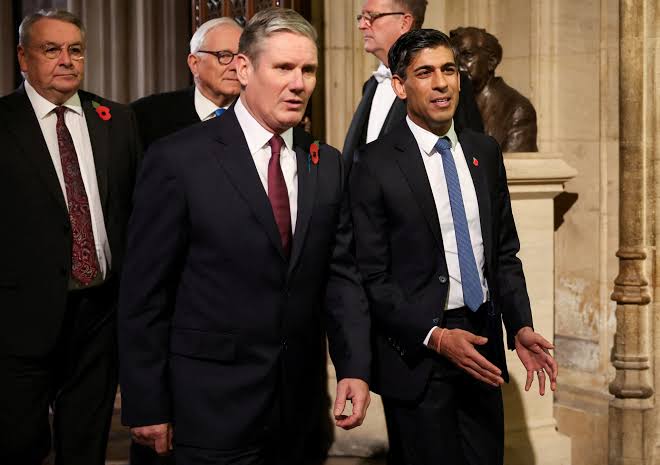
British Prime Minister Rishi Sunak and Labour Party leader Keir Starmer officially launched their election campaigns on Thursday, May 23, 2024 each claiming they have the solutions to pull the country out of its current economic and political woes.
Sunak, whose Conservative Party has been trailing Labour by approximately 20 percentage points in opinion polls since he assumed office in October 2022, surprised many by calling for a July 4 election, months earlier than expected. “Economic stability is now returning to the country,” Sunak told GB News television. “Although I know not everyone is feeling the full benefits of that yet, it’s clear that we have turned a corner. Now is the moment to look to the future.”
Sunak argued that the economy was improving and he had a plan to address illegal immigration. However, with shop prices increasing by 21% over the last three years and the National Health Service struggling with record waiting times, convincing voters that the country is on the right track may be challenging. He also acknowledged that the first flights sending illegal migrants to Rwanda, a key policy, would not occur before the election due to ongoing legal challenges.
The former investment banker announced his decision amid pouring rain in Downing Street on Wednesday, having to shout over protesters playing “Things Can Only Get Better” – a song associated with Labour’s 1997 election victory under Tony Blair. This victory ended the last prolonged period of Conservative rule.
At stake in this election is control of the world’s sixth-largest economy, which has faced years of low growth and high inflation, is still dealing with the repercussions of its 2016 decision to leave the European Union, and is recovering from the impacts of COVID-19 and the war in Ukraine. Both parties are expected to focus on critical issues such as migration control, tax and spending policies, and security.
Polls indicate that voters are seeking change after 14 years of Conservative government marked by significant political turmoil and divisive cultural issues. Despite this desire for change, there is not a strong enthusiasm for Starmer and his Labour Party. Starmer, a former chief prosecutor, has moved Labour’s politics back to the center after a shift to the left under his predecessor. “Labour will stop the chaos, turn the page and get Britain’s future back,” Starmer said in an early campaign message to party members, describing the election as “the fight of our lives.”
If Labour wins, Starmer would become Britain’s sixth prime minister in eight years, a level of political turnover not seen since the 1830s, highlighting the political instability that has gripped the country.
As the campaign begins, parliamentary activity is expected to increase as the government decides which legislative measures to prioritize and which to abandon. One significant piece of legislation under discussion is Sunak’s plan to implement some of the world’s strictest anti-smoking rules by banning anyone aged 15 and under from ever buying cigarettes.
Coffee shop worker Kitty McMurray, reflecting a common sentiment, expressed the urgency of the election: “Bring it on,” she said, noting that it felt like everything was falling apart and an election was needed.
Both Sunak and Starmer are expected to hit the campaign trail, aiming to engage with voters and push their messages in hopes of securing enough parliamentary seats to form a majority government on July 5.








